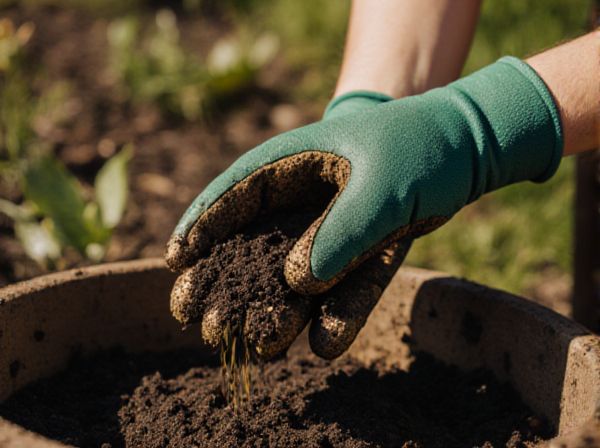
Compost tea vs chemical solution Illustration
Compost tea enriches soil with natural nutrients and beneficial microorganisms, enhancing plant growth sustainably without harmful residues. Chemical solutions provide quick nutrient boosts but can disrupt soil health and contribute to environmental pollution. Choosing compost tea promotes long-term soil vitality and eco-friendly gardening practices.
Table of Comparison
| Feature | Compost Tea | Chemical Solution |
|---|---|---|
| Source | Organic compost, water, beneficial microbes | Synthetic chemicals, laboratory formulas |
| Environmental Impact | Eco-friendly, enhances soil health | Potential soil and water pollution |
| Effect on Plants | Promotes natural growth, microbial diversity | Fast nutrient delivery, may harm beneficial organisms |
| Safety | Non-toxic, safe for humans and wildlife | Can be toxic, requires careful handling |
| Cost | Low to moderate, depends on materials | Variable, often higher due to production |
| Longevity | Improves long-term soil fertility | Short-term nutrient boost |
Understanding Compost Tea: A Natural Fertilizer
Compost tea is a natural fertilizer brewed from compost, water, and oxygen, teeming with beneficial microorganisms that enhance soil health and plant growth. Unlike chemical solutions that provide nutrients in synthetic forms and may harm soil microbial life, compost tea promotes a balanced ecosystem by boosting microbial diversity and nutrient availability. This organic approach supports sustainable agriculture by improving soil structure, increasing nutrient uptake, and reducing the need for harmful chemical fertilizers.
Chemical Solutions in Gardening: An Overview
Chemical solutions in gardening primarily consist of synthetic fertilizers and pesticides designed to enhance plant growth and control pests efficiently. These substances often provide immediate nutrient availability and pest control but can lead to soil degradation, reduced microbial diversity, and potential environmental harm with prolonged use. Understanding the chemical composition and application rates is crucial to balance effectiveness and minimize negative impacts on soil health and ecosystem sustainability.
Ingredients: Compost Tea vs Chemical Fertilizer
Compost tea is made from aerated water infused with decomposed organic matter, rich in beneficial microorganisms, nutrients, and humic acids that enhance soil health and plant growth naturally. Chemical fertilizers consist primarily of synthesized compounds such as nitrogen, phosphorus, and potassium in concentrated forms, designed for immediate nutrient delivery but lacking organic matter and microbes. The biological complexity in compost tea promotes sustainable soil ecosystems, whereas chemical solutions may disrupt microbial balance and degrade soil quality over time.
Soil Health Benefits: Organic vs Synthetic Approaches
Compost tea enhances soil health by introducing beneficial microorganisms that improve nutrient availability and promote a balanced soil ecosystem, whereas chemical solutions often disrupt microbial communities and degrade soil structure over time. Organic compost tea supports long-term soil fertility and resilience by fostering natural biological processes, while synthetic chemicals can lead to nutrient imbalances and increased dependency on external inputs. Emphasizing compost tea aligns with sustainable soil management practices that prioritize ecological balance and soil vitality.
Impact on Plant Growth and Yield
Compost tea enhances plant growth and yield by improving soil microbial activity, nutrient availability, and root development, leading to healthier and more resilient plants. Chemical solutions often provide rapid nutrient delivery but can disrupt soil ecology and reduce long-term fertility, sometimes causing nutrient imbalances or toxicity. Studies show organic compost tea treatments increase crop yield sustainably while maintaining soil health compared to conventional chemical fertilizers.
Environmental Effects: Sustainable Gardening Choices
Compost tea enhances soil microbial diversity, promoting natural nutrient cycling, whereas chemical solutions often disrupt soil ecosystems and contribute to pollution. Sustainable gardening practices favor compost tea to reduce chemical runoff and protect water quality. Organic inputs like compost tea support long-term soil health and biodiversity, minimizing environmental impact compared to synthetic fertilizers.
Microbial Activity: Boosting Beneficial Soil Life
Compost tea significantly enhances microbial activity by introducing diverse beneficial microorganisms that improve soil health and nutrient availability. In contrast, chemical solutions often inhibit microbial life, disrupting natural soil ecosystems and reducing long-term fertility. Increased microbial populations from compost tea promote organic matter breakdown and plant root growth, supporting sustainable agriculture practices.
Application Methods: Brewing vs Mixing Chemicals
Compost tea is brewed through aeration processes that encourage beneficial microbial growth, enhancing soil and plant health by introducing natural nutrients and microorganisms. Chemical solutions are mixed directly, providing immediate nutrient availability but lacking microbial diversity and soil conditioning benefits. Brewing compost tea requires time and careful aeration, whereas chemical solutions allow for straightforward application with faster nutrient release.
Cost Analysis: Organic Inputs vs Chemical Products
Compost tea, derived from organic waste materials, typically incurs lower production costs compared to chemical solutions due to the use of readily available natural inputs and minimal processing requirements. Chemical products often involve higher expenses stemming from synthetic ingredient manufacturing, transportation, and regulatory compliance fees. Over time, compost tea offers cost-efficiency and sustainability benefits by reducing dependency on expensive chemical fertilizers and pesticides.
Choosing the Best Solution for Organic Gardens
Compost tea enriches soil with beneficial microorganisms, improving plant health and disease resistance in organic gardens, unlike chemical solutions that often introduce harmful residues. Organic gardeners prioritize compost tea for its sustainable nutrient cycling and natural pest suppression, ensuring long-term soil fertility without synthetic chemicals. Selecting compost tea over chemical alternatives aligns with eco-friendly practices, promoting vibrant, resilient plants while protecting the environment.
Compost tea vs chemical solution Infographic

 gardendif.com
gardendif.com